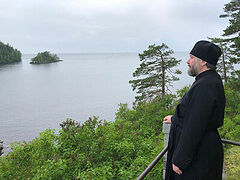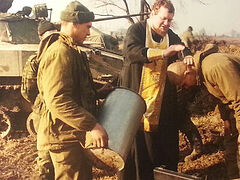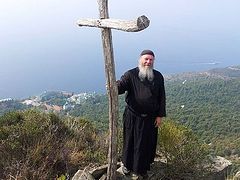Archpriest Oleg Teor is the rector of the Pskov military Church of the Right-Believing Grand Prince Alexander Nevsky and head of the diocesan Department for Interaction with the Russian Armed Forces. Fr. Oleg served in the army in the Kronstadt garrison. He was led around the altar during his ordination to the diaconate by Fr. Nathaniel (Pospelov), and by Fr. John (Krestiankin) during his ordination to the priesthood. Fr. Oleg had a long-term spiritual friendship with the elder Archpriest Nikolai (Guryanov). He has spent time in Chechnya, Syria, Yugoslavia, and Dagestan, pastoring military personnel. Many call him “the division’s Batiushka.”
This is a story from the “Everyday Saints of Our Days” series prepared by the publishing house of the Pskov Caves Monastery.
Always surrounded by believers
 Archpriest Oleg Teor I have been a believer since I was a child. Everyone was religious in our village, so I was always surrounded by believers from my infancy. When I was in school, already in middle or high school, a teacher from Estonia came, and that was the first time we heard that there is no God.
Archpriest Oleg Teor I have been a believer since I was a child. Everyone was religious in our village, so I was always surrounded by believers from my infancy. When I was in school, already in middle or high school, a teacher from Estonia came, and that was the first time we heard that there is no God.
And I always tried to be with believers, to be in the Church; I served and read in church. I spoke with pious people, including elders. Elder Nikolai (Guryanov) sent me a message to come to see him when I was in Samolva before my ordination to the priesthood. It took a few transfers and boat rides to reach him. And he gave me more instructions in fifteen minutes than others could in several years. He gave me a towel and showed me how to hold an orarion and which petitions to read when I would be a deacon. Later, I visited Elder Nikolai often and even spent the night more than once.
At that time, churches were being closed so there would be fewer religious societies. And if there was a free church somewhere, whether in the country, or in the backwoods, these places were occupied by Protestants or other confessions. So I decided: So that there would be one less lock on a church, so that yet another church wouldn’t be closed, I would become a priest.
How I served in the army
I was constantly studying. I was never free; I went to night school. When I passed my last exam, I was given two large, thick, stitched envelopes, probably so I could give one to the recruitment office in Leningrad and the other to the commander of my unit when I would arrive there. The way it was then, as soon as I passed my last exam, I had to immediately go to the bus to head directly to the recruitment office in Leningrad. I arrived in Leningrad early, probably before six in the morning. I went to the St. Nicholas Naval Cathedral because I knew it was open. A babushka gave me a small icon from the panikhida table there, which I kept with me at all times, including in the army. The Lord arranged so that no one saw it.
Then we were transported out of Leningrad for a long time. We sailed past the Kronstadt cathedral, and we could see Vladimir Cathedral—we travelled right around. Finally, we got to Kronstadt. I had been told before: “We’re sending you somewhere where you won’t be able to go to church.” There wasn’t a single open church in Kronstadt then, and that’s where I did my service. They treated me well, because there were secret believers among the soldiers and officers then.
“Fr. John (Krestiankin) led me around the altar”
After the army, I decided to go to seminary. There was a meeting about it, and one Hero of Socialist Labor with a pentagonal gold star said that people like me should have their heads torn off. That’s the kind of “freedom” there was.
I went to become a priest so that a church somewhere would be open. I hadn’t gone previously because I wasn’t musically talented, and in our area, everyone thought that a deacon, priest, and church singers should serve musically. And I went like that. It was in the winter, somewhere around St. Cornelius’ day. It was a feast day. And it just so happened that I lost my passport in the monastery.1 It turns out that one batiushka, I don’t remember who, hastily put on my coat and left. And my passport was in it. I told Metropolitan John that I had lost my passport, that this batiushka probably took it, and he told me they wouldn’t ordain me. I walked past the brothers’ residence and saw Fr. Iliya, the Patriarch’s confessor, coming. He told me, “Don’t worry.” It felt like some kind of chrism, some kind of pleasant feeling spread over my chest, all over me.
 Archimandrite John (Krestiankin) Some time passed, and they ordained me to the diaconate on the feast of the Ascension. Everything was fine, I knew the services, and even Fr. Theodorit, the paramedic, was watching me. Everyone said that I knew the service better than everyone. But Metropolitan John said that he didn’t need deacons—he needed priests.
Archimandrite John (Krestiankin) Some time passed, and they ordained me to the diaconate on the feast of the Ascension. Everything was fine, I knew the services, and even Fr. Theodorit, the paramedic, was watching me. Everyone said that I knew the service better than everyone. But Metropolitan John said that he didn’t need deacons—he needed priests.
I was ordained as a deacon on the Ascension, and Archimandrite Nathaniel led me around the altar. Then we went to Pskov for Pentecost. I went with Fr. John (Krestiankin); we did a lot of walking around Pskov. Fr. John bowed to almost every person and greeted them. We reached the diocese. There was a room in the garage there where we spent the night. On the feast of Pentecost, I was ordained as a priest. I was a deacon for ten days. I was led around the altar by Fr. John (Krestiankin), because the others had good voices and had to sing. So Fr. John led me around the altar. I later told the accountant Nina Vladimirovna what happened, and she said, “That’s no accident. It’s the providence of God.” I later went to see Fr. John very often, especially when I had my first parish.
Elder Nikolai’s “sober” rock
Fr. John also came to visit me in the village of Beloe, in the Dno District, for the Nativity of the Most Holy Theotokos. There were a lot of people. But the roof was bad; it was leaking. We put buckets in the church where it was leaking through the attic, and we put makeshift brooms in the buckets so you couldn’t hear the water dripping. Then, finally, the roof was fixed, and the church became one of the best and most well-known.
Fr. John and Fr. Nikolai were teetotalers and unmercenaries—they wouldn’t take any money. When they were offered money for a trip or something else, Fr. John wouldn’t take it, and neither would Fr. Nikolai.
Near the garden wall where he lived, Fr. Nikolai had a small rock. And whenever someone had any alcohol, he would take the bottle and break it on the rock. One day his relative said, “Fr. Nikolai! We’re family.” And he said, “Yes, we’re family.” And he broke the bottle.
They were very simple and economical. Elder Nikolai even saved paper. I still have his letters and other documents that he wrote. He used paper very sparingly, and clothes too. They were all patched up. His pants were all in patches. One time, when he was old already, they sent him somewhere—to Moscow or somewhere down south. Someone from the government—Kosygin I think his name was—noticed him. He said: “What a state we have, when the clergy have the right to receive treatment.” Fr. Nikolai was then asked to remove his cassock. When they saw that his pants were covered in patches, they said: “Alright, never mind.” So he went around in his cassock.
A procession … around the station
We didn’t have a big chalice, just a small one. I said, “Fr. John! We need a bigger chalice. There’s going to be a lot of people.” Fr. John asked Fr. Seraphim from the St. Lazarus Church to bring vessels with him. Dno train station had a room where people could spend the night if they arrived early. Fr. John started looking for this waiting room. Dno is a junction station. They were with Vasily Vasilievich then, a tenor from St. Petersburg. They got to the station and started looking for the room. They walked around the whole station. Fr. John said, “We had a cross procession with the vessels around the station.”
There was another wonderful man with us—Fr. Anatoly, a hierodeacon. He had one arm. His monastic belt was pulled so tight that you couldn’t get a finger behind it. He always carried a bag over his shoulders, with books in the bag. I always got changed at Fr. Anatoly’s and stayed there. He knew the people living in the villages, and they knew him. As a child, the people he was living with were always finding fault with him, for how he picked up a candle, and everything else… Everyone picked on him.
Serving in “hot spots”
The chief Air Force commander said, well there’s a priest in Pskov. I was ready to fly immediately. We flew to Chechnya, to Yugoslavia when they were bombing there, to Syria—they treated us very well there. We exposed the media that was reporting everywhere that the Syrians use gas. Some relatives of my friends from Moscow asked, “How did you feel amidst the gas there?” But they hadn’t managed to deliver the gas, they were just in transport—I don’t remember now, but through some countries, former socialists countries I think. They hadn’t delivered the gases, but the media was already talking about them everywhere. So we had to expose them, then everything worked out well.
The Syrian people treated us very well. I had this [pectoral] cross with me; they saw it… There are many Muslims there, but the Muslims and Christians live like one family. I even remember, a child was born in one Muslim family, and that same day they invited me to come bless their child. I went. They were glad to see a priest.
I remember now how I was in Chechnya or in other “hot spots,” which was a joy for the guys. I probably took about a ton of paper to Chechnya so they could write letters home, and I showed them how to make envelopes. We took humanitarian aid to Syria too. We also took food there, including to the children, of course… They were very afraid that I would be killed somewhere… One Syrian was always counting us, making sure everyone was in their place. There was no time to think about fear. We knew we had to go, so we went—we flew there. We felt we were in demand there; they needed us.
We saw the bombing. When we were in Serbia, and in Yugoslavia (they don’t like being called Yugoslavians) we saw what happened right after the English bombardments… When we got there, they said one of their local women had been wounded. There was a lot going on, of course. But there was no fear, because there was no time for it. Maybe others took us clergy for an example.
A sign of our salvation
Once I was called in to the Regional Executive Committee. The secretary told me, “You musn’t send off the dying.” But I had come to serve Unction—and people didn’t die, but on the contrary, they recovered. I was faulted for the fact that they were recovering. Such difficult times we had then.
I paid attention to secular issues, to the religious worldview of Pushkin, and the topic of “Pushkin and the Church.” At that time, they thought Pushkin was practically a candidate for the Communist Party, and they would bring forth various blasphemous works that perhaps Pushkin would not always have agreed with. So I dug up everything that showed that Pushkin was a believer. After all, when he was in the Svyatogorsk Monastery, he arranged to be buried not far from the altar. And they served his funeral. Before his death, they asked Pushkin which priest to call for confession and parting words, and he said: “Any.” This was on Konyushennaya street in St. Petersburg, and they served his funeral in the church there.
The Church and state should be in harmony. This creates the best order. And, of course, we have to fight against blasphemy, ridicule, against anything that insults the faithful. This just happened not long ago, with people washing their dirty shoes in a holy place, and Kadyrov made them apologize.2 A man should apologize or explain himself if he did something wrong—the same goes for states. What good was it shooting those who didn’t agree with communism during or after the revolution? What did it lead to? It led to the Lord’s victory. It was not the communists, but the Lord Who won. The communists had so many weapons, and propaganda, but Jesus Christ didn’t have a single soldier. Jesus Christ conquered the entire world by His martyrdom, without a single soldier. That’s why the cross is erected in all the honorable places in the world, and it’s a sign of our salvation.






